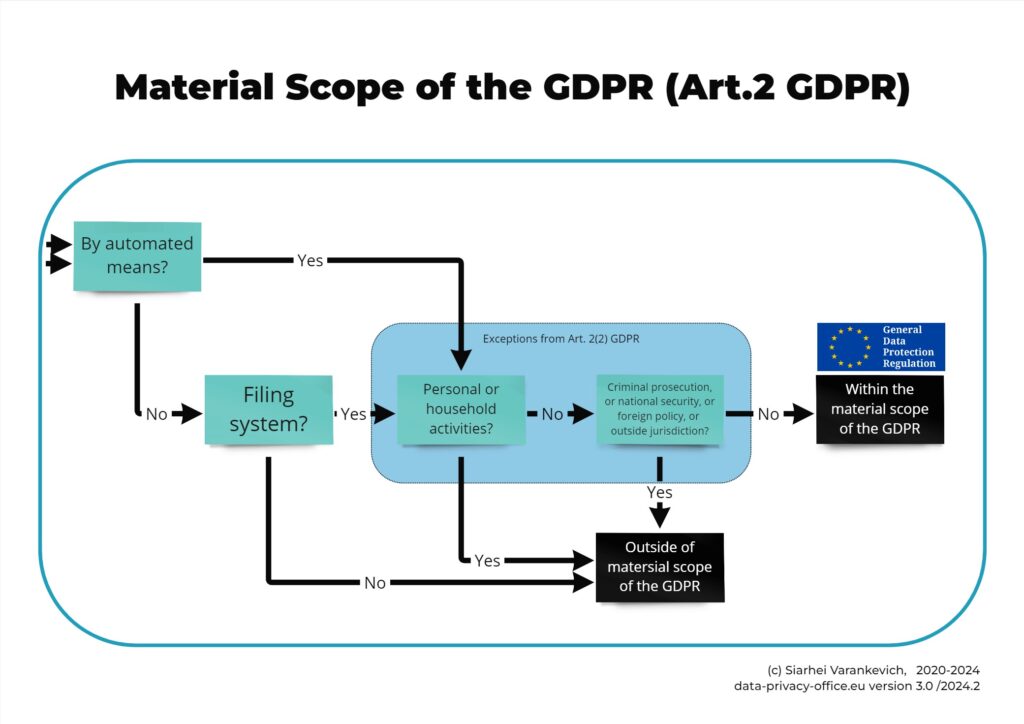(14) Den beskyttelse, som denne forordning yder i forbindelse med behandling af personoplysninger, bør finde anvendelse på fysiske personer uanset nationalitet eller bopæl. Denne forordning finder ikke anvendelse på behandling af personoplysninger, der vedrører juridiske personer, navnlig virksomheder, der er etableret som juridiske personer, herunder den juridiske persons navn, form og kontaktoplysninger.
(14) The protection afforded by this Regulation should apply to natural persons, whatever their nationality or place of residence, in relation to the processing of their personal data. This Regulation does not cover the processing of personal data which concerns legal persons and in particular undertakings established as legal persons, including the name and the form of the legal person and the contact details of the legal person.
(15) For at undgå at skabe en alvorlig risiko for omgåelse bør beskyttelsen af fysiske personer være teknologineutral og ikke afhænge af de anvendte teknikker. Beskyttelsen af fysiske personer bør gælde for både automatisk og manuel behandling af personoplysninger, hvis personoplysningerne er indeholdt eller vil blive indeholdt i et register. Sagsmapper eller samlinger af sagsmapper samt deres forsider, som ikke er struktureret efter bestemte kriterier, bør ikke være omfattet af denne forordnings anvendelsesområde.
(15) In order to prevent creating a serious risk of circumvention, the protection of natural persons should be technologically neutral and should not depend on the techniques used. The protection of natural persons should apply to the processing of personal data by automated means, as well as to manual processing, if the personal data are contained or are intended to be contained in a filing system. Files or sets of files, as well as their cover pages, which are not structured according to specific criteria should not fall within the scope of this Regulation.
(16) Denne forordning finder ikke anvendelse på spørgsmål vedrørende beskyttelse af grundlæggende rettigheder og frihedsrettigheder eller fri udveksling af personoplysninger, der vedrører aktiviteter, som falder uden for EU-retten, såsom aktiviteter vedrørende statens sikkerhed. Denne forordning finder ikke anvendelse på behandling af personoplysninger, der foretages af medlemsstaterne, når de udfører aktiviteter i forbindelse med Unionens fælles udenrigs- og sikkerhedspolitik.
(16) This Regulation does not apply to issues of protection of fundamental rights and freedoms or the free flow of personal data related to activities which fall outside the scope of Union law, such as activities concerning national security. This Regulation does not apply to the processing of personal data by the Member States when carrying out activities in relation to the common foreign and security policy of the Union.
(17) Europa-Parlamentets og Rådets forordning (EF) nr. 45/2001 (6) finder anvendelse på behandling af personoplysninger, der foretages af Unionens institutioner, organer, kontorer og agenturer. Forordning (EF) nr. 45/2001 og andre EU-retsakter, der finder anvendelse på sådan behandling af personoplysninger, bør tilpasses til principperne og bestemmelserne fastsat i nærværende forordning og anvendes i lyset af nærværende forordning. Med henblik på at sikre en stærk og sammenhængende databeskyttelsesramme i Unionen bør de nødvendige tilpasninger af forordning (EF) nr. 45/2001 følge efter vedtagelsen af nærværende forordning, således at de finder anvendelse samtidig med nærværende forordning.
(17) Regulation (EC) No 45/2001 of the European Parliament and of the Council [6] applies to the processing of personal data by the Union institutions, bodies, offices and agencies. Regulation (EC) No 45/2001 and other Union legal acts applicable to such processing of personal data should be adapted to the principles and rules established in this Regulation and applied in the light of this Regulation. In order to provide a strong and coherent data protection framework in the Union, the necessary adaptations of Regulation (EC) No 45/2001 should follow after the adoption of this Regulation, in order to allow application at the same time as this Regulation.
[6] Europa-Parlamentets og Rådets forordning (EF) nr. 45/2001 af 18. december 2000 om beskyttelse af fysiske personer i forbindelse med behandling af personoplysninger i fællesskabsinstitutionerne og -organerne og om fri udveksling af sådanne oplysninger (EFT L 8 af 12.1.2001, s. 1). https://eur-lex.europa.eu/legal-content/EN/AUTO/?uri=OJ:L:2001:008:TOC
[6] Regulation (EC) No 45/2001 of the European Parliament and of the Council of 18 December 2000 on the protection of individuals with regard to the processing of personal data by the Community institutions and bodies and on the free movement of such data (OJ L 8, 12.1.2001, p. 1). https://eur-lex.europa.eu/legal-content/EN/AUTO/?uri=OJ:L:2001:008:TOC
(18) Denne forordning gælder ikke for en fysisk persons behandling af oplysninger under en rent personlig eller familiemæssig aktivitet og således uden forbindelse med en erhvervsmæssig eller kommerciel aktivitet. Personlige eller familiemæssige aktiviteter kan omfatte korrespondance og føring af en adressefortegnelse eller sociale netværksaktiviteter og onlineaktiviteter, der udøves som led i sådanne aktiviteter. Denne forordning gælder dog for dataansvarlige eller databehandlere, som tilvejebringer midlerne til behandling af personoplysninger til sådanne personlige eller familiemæssige aktiviteter.
(18) This Regulation does not apply to the processing of personal data by a natural person in the course of a purely personal or household activity and thus with no connection to a professional or commercial activity. Personal or household activities could include correspondence and the holding of addresses, or social networking and online activity undertaken within the context of such activities. However, this Regulation applies to controllers or processors which provide the means for processing personal data for such personal or household activities.
(19) Beskyttelse af fysiske personer i forbindelse med de kompetente myndigheders behandling af personoplysninger med henblik på at forebygge, efterforske, afsløre eller retsforfølge strafbare handlinger eller fuldbyrde strafferetlige sanktioner, herunder beskyttelsen mod og forebyggelsen af trusler mod den offentlige sikkerhed og den frie udveksling af sådanne oplysninger, er genstand for en specifik EU-retsakt. Denne forordning bør derfor ikke gælde for behandlingsaktiviteter med disse formål. Behandling af personoplysninger af offentlige myndigheder, som er omfattet af denne forordning, med henblik på disse formål bør imidlertid være genstand for en mere specifik EU-retsakt, Europa-Parlamentets og Rådets direktiv (EU) 2016/680 (7). Medlemsstater kan overdrage opgaver, der ikke nødvendigvis foretages med henblik på at forebygge, efterforske, afsløre eller retsforfølge strafbare handlinger eller fuldbyrde strafferetlige sanktioner, herunder beskytte mod og forebygge trusler mod den offentlige sikkerhed, til de kompetente myndigheder som omhandlet i direktiv (EU) 2016/680, således at behandling af personoplysninger til disse andre formål, for så vidt som de er omfattet af EU-retten, falder ind under denne forordnings anvendelsesområde.
(19) The protection of natural persons with regard to the processing of personal data by competent authorities for the purposes of the prevention, investigation, detection or prosecution of criminal offences or the execution of criminal penalties, including the safeguarding against and the prevention of threats to public security and the free movement of such data, is the subject of a specific Union legal act. This Regulation should not, therefore, apply to processing activities for those purposes. However, personal data processed by public authorities under this Regulation should, when used for those purposes, be governed by a more specific Union legal act, namely Directive (EU) 2016/680 of the European Parliament and of the Council [7]. Member States may entrust competent authorities within the meaning of Directive (EU) 2016/680 with tasks which are not necessarily carried out for the purposes of the prevention, investigation, detection or prosecution of criminal offences or the execution of criminal penalties, including the safeguarding against and prevention of threats to public security, so that the processing of personal data for those other purposes, in so far as it is within the scope of Union law, falls within the scope of this Regulation.
Med hensyn til disse kompetente myndigheders behandling af personoplysninger til formål, der er omfattet af anvendelsesområdet for denne forordning, bør medlemsstaterne kunne opretholde eller indføre mere specifikke bestemmelser for at tilpasse anvendelsen af reglerne i denne forordning. Sådanne bestemmelser kan mere præcist fastlægge specifikke krav til disse kompetente myndigheders behandling af personoplysninger til disse andre formål under hensyntagen til den forfatningsmæssige, organisatoriske og administrative struktur i den pågældende medlemsstat. Når behandling af personoplysninger foretaget af private organer er omfattet af denne forordnings anvendelsesområde, bør forordningen give medlemsstaterne mulighed for på særlige betingelser ved lov at begrænse visse forpligtelser og rettigheder, når en sådan begrænsning udgør en nødvendig og forholdsmæssig foranstaltning i et demokratisk samfund for at sikre bestemte vigtige interesser, herunder den offentlige sikkerhed og forebyggelse, efterforskning, afsløring eller retsforfølgning af strafbare handlinger eller fuldbyrdelse af strafferetlige sanktioner, herunder beskyttelse mod og forebyggelse af trusler mod den offentlige sikkerhed. Dette er f.eks. relevant inden for rammerne af bekæmpelse af hvidvaskning af penge eller kriminaltekniske laboratoriers aktiviteter.
With regard to the processing of personal data by those competent authorities for purposes falling within scope of this Regulation, Member States should be able to maintain or introduce more specific provisions to adapt the application of the rules of this Regulation. Such provisions may determine more precisely specific requirements for the processing of personal data by those competent authorities for those other purposes, taking into account the constitutional, organisational and administrative structure of the respective Member State. When the processing of personal data by private bodies falls within the scope of this Regulation, this Regulation should provide for the possibility for Member States under specific conditions to restrict by law certain obligations and rights when such a restriction constitutes a necessary and proportionate measure in a democratic society to safeguard specific important interests including public security and the prevention, investigation, detection or prosecution of criminal offences or the execution of criminal penalties, including the safeguarding against and the prevention of threats to public security. This is relevant for instance in the framework of anti-money laundering or the activities of forensic laboratories.
[7] Europa-Parlamentets og Rådets direktiv (EU) 2016/680 af 27. april 2016 om beskyttelse af fysiske personer i forbindelse med kompetente myndigheders behandling af personoplysninger med henblik på at forebygge, efterforske, afsløre eller retsforfølge strafbare handlinger eller fuldbyrde strafferetlige sanktioner og om fri udveksling af sådanne oplysninger og om ophævelse af Rådets rammeafgørelse 2008/977/RIA (se side 89 i denne EUT).
[7] Directive (EU) 2016/680 of the European Parliament and of the Council of 27 April 2016 on the protection of natural persons with regard to the processing of personal data by competent authorities for the purposes of prevention, investigation, detection or prosecution of criminal offences or the execution of criminal penalties, and the free movement of such data and repealing Council Framework Decision 2008/977/JHA (see page 89 of this Official Journal).
(20) Selv om denne forordning bl.a. finder anvendelse på domstoles og andre judicielle myndigheders aktiviteter, kan EU-retten eller medlemsstaternes nationale ret præcisere, hvilke behandlingsaktiviteter og -procedurer der finder anvendelse i forbindelse med domstoles og andre judicielle myndigheders behandling af personoplysninger. Tilsynsmyndighedernes kompetence bør af hensyn til dommerstandens uafhængighed under udførelsen af dens judicielle opgaver, herunder ved beslutningstagning, ikke omfatte domstolenes behandling af personoplysninger, når domstole handler i deres egenskab af domstol. Tilsynet med sådanne databehandlingsaktiviteter bør kunne overdrages til specifikke organer i medlemsstatens retssystem, der navnlig bør sikre overholdelsen af reglerne i denne forordning, gøre dommerstanden bekendt med dens forpligtelser i henhold til denne forordning og behandle klager over sådanne databehandlingsaktiviteter.
(20) While this Regulation applies, inter alia, to the activities of courts and other judicial authorities, Union or Member State law could specify the processing operations and processing procedures in relation to the processing of personal data by courts and other judicial authorities. The competence of the supervisory authorities should not cover the processing of personal data when courts are acting in their judicial capacity, in order to safeguard the independence of the judiciary in the performance of its judicial tasks, including decision-making. It should be possible to entrust supervision of such data processing operations to specific bodies within the judicial system of the Member State, which should, in particular ensure compliance with the rules of this Regulation, enhance awareness among members of the judiciary of their obligations under this Regulation and handle complaints in relation to such data processing operations.
(21) Denne forordning berører ikke anvendelsen af Europa-Parlamentets og Rådets direktiv 2000/31/EF (8), navnlig reglerne om formidleransvar for tjenesteydere, der er fastsat i artikel 12-15 i dette direktiv. Direktivet har til formål at bidrage til et velfungerende indre marked ved at sikre den frie bevægelighed for informationssamfundstjenester mellem medlemsstaterne.
(21) This Regulation is without prejudice to the application of Directive 2000/31/EC of the European Parliament and of the Council [8], in particular of the liability rules of intermediary service providers in Articles 12 to 15 of that Directive. That Directive seeks to contribute to the proper functioning of the internal market by ensuring the free movement of information society services between Member States.








(EN) This article limits the scope of the GDPR. The European legislators have decided not to burden the majority of the population with numerous rules in the household and private life. They removed from the Regulation the processes of processing that do not pose a big threat (not automated processing where personal data is not collected in the system).
The combination “automated means” covers primarily…
(EN) […]
(EN) Sign in
to read the full text